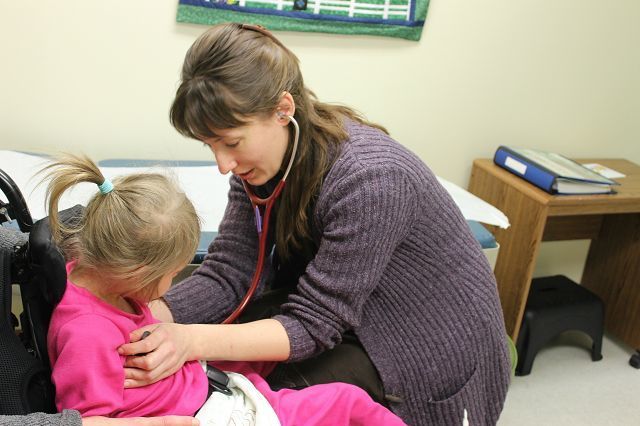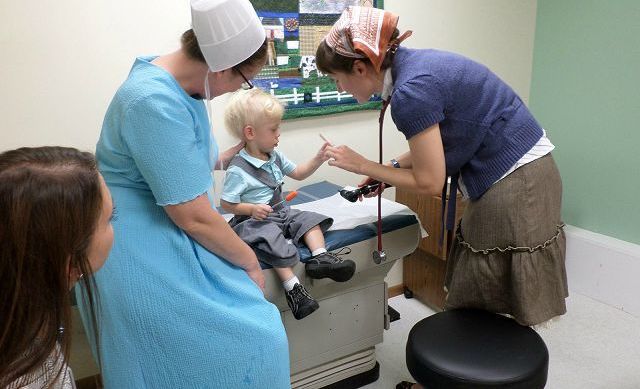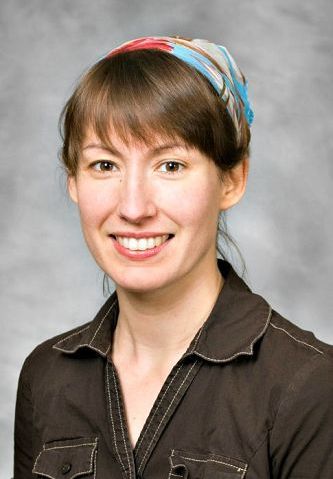New Leaf Center focuses on special needs children
At the bottom of a small unassuming brick building, Dr. Olivia Wenger reviews a few medical charts before greeting one of her young patients. Once a dentists office, it has become Wengers clinic, called New Leaf Center, catering specifically to children with rare genetic disorders and special needs.
A pale blue waiting room with colorful depictions of animals and toys is available to give weary parents and their young children a bit of comfort as is every exam room in the clinic. A dispensary provides prescriptions at a reduced rate to save money, a lab will help Wenger read results and each of the four nurses in the building go beyond their medical training to coordinate patient care with other specialists, be they at Akron Childrens Hospital or as far away as England.
Its one of the few clinics dedicated to special disorders in the United States, and it is located in none other than Mt. Eaton. When it opened in 2013, Wenger, the only physician on staff, saw up to 150 patients a year, mainly from the Amish community. Four years later she has up to 350 patients coming from four primary counties: Wayne, Holmes, Coshocton and Ashtabula. But she has received patients who came from as far as Minnesota.
We are in this ordinary basement, but what were doing, our physician and nurses are doing cutting-edge things, said Barb Reinford, the clinics executive director.
Were kind of where the rubber meets the road, the intersection of medical knowledge and cultural tenants and themes, Wenger said. I think its a fascinating place to be.
Studying and treating rare disorders is just a piece of the clinics mission. The idea behind the clinic is to provide coordinated care. When Wenger isnt working with a patient, she may be reaching out to colleagues at Akron Childrens, contacting the clinics prototypes in Pennsylvania to review her diagnosis or discuss symptoms and treatments, or reaching out to a genetic disorder research organization called Windows of Hope, located in England.
When the nurses arent visiting patients, they are often contacting church funds or other sponsored systems to help offset costs for families as well as working to arrange transportation or help families overcome any additional barriers they may face when trying to treat a child.
When families do arrive, Wenger will sit down with a patient and their family for one to two hours, gathering as much background as possible on the family and the patient. On any given day she will treat a cerebral palsy patient for constipation or a down syndrome patient for a nasty cough and seizures. But the real challenges come when diagnosing and treating patients with even rarer disorders such as Geneva Burkholder.
At age 7 Burkholder has a rare genetic disorder called GM3 synthase deficiency.
Burkholder started exhibiting signs of an issue shortly after she was born. Like other children with the disorder, thats when she showed poor ability to eat, react or hit normal infant milestones. These children often suffer from intense seizures. She is unable to sit alone or communicate verbally, and at the moment there is no real treatment available for her condition. It is caused by an enzyme in the brain not creating the chemical GM3, which is necessary for the brain to communicate the need to move, speak and more.
The small girl was almost inconsolable as Wenger moved closer to examine her. Without the ability to communicate, tears were one of the few options to express herself.
New Leaf has patients treated for 22 different disorders including glycogen storage disease, Amish brittle hair syndrome, down syndrome, Mennonite microcephaly and propionic acidemia.
Half of the diseases are disorders of the brain: development and seizure, growth, learning problems ... Most of the kids we take care of, it would be pretty obvious there is something medically wrong: a child not speaking normally or able to walk into the office, she said. Those happen anywhere, but its easier for us because we know which genetic misspellings are pretty common in our community.
Elsewhere it may be difficult to find a proper diagnosis for a patient, and oftentimes it can cost families thousands of dollars to run a battery of tests before they do. Wenger said genetic disorders are often dismissed but shouldnt be.
Theres no way to avoid genetic disease, Wenger said. Anywhere in the world where people have lived in the same place for a long time, some genetic diseases become more common, and some become less common. So cystic fibrosis is a European disease. Sickle cell is an African-American disease.
Genetic diseases are often seen as a message of discouragement or hopelessness, Wenger said. Its not like that anymore. As we learn more about it, we can intervene. Theres a lot of hope with genetic disease disorders that didnt used to be there.
Wenger found her niche working with the Amish population.
In North America there are 308,000 Amish people with 40,000 of those individuals residing in Holmes, Wayne, Tuscarawas and Coshocton counties.
Wenger started out training as a general pediatrician at Akron Childrens Hospital and also met with a fair amount of Amish patients. Traditional medicine didnt fulfill Wenger, and she reached out to Dr. Holmes Morton, a doctor who founded the Clinic for Special Children in Strasburg, Pennsylvania. Morton invited her to practice at his clinic, where he shared the techniques and research used to treat the Amish population.
When Wenger returned to the Wooster area, she resumed work for Akron Childrens Hospital, this time seeking support to create a similar clinic in the area.
With the support of Akron Childrens Hospital along with several Amish and other local churches in the area, New Leaf Center was opened a few years later, allowing medical professionals to focus on those specific disorders and work with a unique culture.
Working with the Amish is a unique experience for Wenger, compared to many of her fellow pediatricians. I think the one thing that continues to put me back in my place is the communitys preference for natural medicine because its easy to assume youre the first person they come to for advice. In reality Im sort of in the middle of the list. As a community the Amish are very resourceful and good at solving their own problems and dont choose to reach out to some fancy doctor very quickly.
That can be very good actually. They dont call me unless they need me. I dont get calls about some kid with a sniffle. Parents are very respectful and thank me for what I do. I have never been chewed out by a dad.
Because the Amish dont purchase health insurance, the clinic is mindful of the sources of income most of the Amish families do utilize, which are self-pay, church funds and the clinic can bill Ohio Crippled Childrens Fund and Bureau for Children with Mental Handicaps Diagnostic.
As a physician working with a unique culture, Wenger has had to adapt her approach and even line of questioning. She said every culture has its sets of givens. Wenger said most Americans can be expected to eat turkey on Thanksgiving and would typically call doctors if faced with medical concerns.
The Amish are more prone to reach out to their parents or other members of the community for advice first and may try to treat their children with a set of natural herbs or remedies that the outside medical community may not understand.
Wenger doesnt necessarily discourage natural remedies, but she has to know whats being used in order to know if its effective, harmless or harmful to a treatment she may need to advise.
Having a clinic like this with all the discussion about how to solve health care issues nationally about whats going on, I think this is a good model, Wenger said.
In addition to supporting research, Wenger loves how much time she as a doctor gets to dedicate to her patients (birth to age 21). When she started out in medicine, she initially struggled with the concept of only giving her patients a few minutes at a time. Now she can interact with them and get to know them in a way she feels is important to medicine.
As a pediatrician you get to glimpse so many families in very private moments in a way. People really trust you with things they wouldnt talk to anyone else about. Being able to use that trust to change the big picture of child health is what I find the most compelling ... I get to provide hope in what could have been a hopeless situation, she said.
New Leaf Clinic is a 501(c)(3) nonprofit organization that depends on donations, which can be sent to New Leaf Center, P.O. Box 336, 15988B E. Chestnut St., Mt. Eaton, OH 44659. For more information call 330-395-9888.






